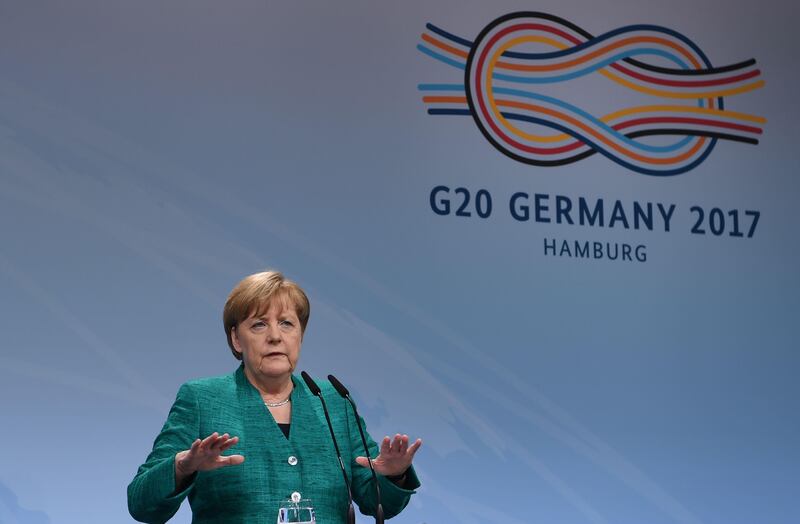Hamburg // While government heads attending the G20 summit in Hamburg struggled to find common ground on climate change, leaving US president Donald Trump isolated, unqualified backing was given to boosting international efforts to defeat terrorism.
Delegates approved a statement calling for stronger curbs on funding, highlighting ISIL, Al Qaeda and their affiliates, and renewed pressure on internet providers to detect and remove content that incites terrorist crimes.
The summit of leaders from 19 industrialised or emerging nations and the European Union also approved a compromise on the contentious issue of global trade in what will be seen as a victory for Mr Trump.
But the final text of the G20 leaders’ deliberations on climate change showed that all member countries except the US wanted the swift implementation of the Paris Agreement and rejected Mr Trump’s demand that what they term an “irreversible” accord should be renegotiated
The former US president Barack Obama signed up to the 2015 accord and was strongly critical of Mr Trump when he withdrew with immediate effect last month, accusing his administration of joining “a small handful of nations that reject the future”.
The G20 statement said: “We reaffirm our strong commitment to the Paris Agreement, moving swiftly towards its full implementation.” It added that leaders “take note” of Mr Trump’s decision to withdraw from the accord, under which the US pledged to reduce emissions by up to 28 per cent of 2005 levels by 2025.
German chancellor Angela Merkel admitted on Friday that official G20 negotiators, known as sherpas, were working hard to overcome “very difficult” issues on agreeing the wording of the joint statement on climate change.
Mrs Merkel and leaders of other G20 countries have done nothing to disguise their dismay at Mr Trump’s stand.
On counter-terrorism, the leaders’ communique declared: “There should be no ‘safe spaces’ for terrorist financing anywhere in the world.”
But it said “inconsistent and weak implementation” of standards set down by the United Nations and the intergovernmental Financial Action Task Force allowed such funding to continue.
It welcomed a recently agreed series of reforms to the way the FATF works and its evolution from a temporary forum, created in 1989 by the Group of Seven (G7), into a permanent “public and political” force against money laundering and terrorism.
The G20 statement said: “We underline our resolve to make the international funding system entirely hostile to terrorist financing and commit to deepening international cooperation and exchange of information – including working with the private sector, which has a critical role in global efforts to counter terrorism financing.”
There was no mention of the dispute between four Middle East countries – Saudi Arabia, the UAE, Bahrain and Egypt – and Qatar, which they accuse of sponsoring and financing terrorism.
But the statement said world leaders stood “united and firm in the fight against terrorism and its financing”. It described terrorism as a scourge and called for “terrorist safe havens” to be eliminated wherever they occurred.
The leaders also agreed to facilitate the “swift and targeted” sharing of information between intelligence, law enforcement agencies and judicial authorities.
On the internet’s role in terrorism, they pledged to work with service providers to crack down on the exploitation of the web and social media for propaganda, radicalisation and recruitment, the funding and planning of terrorist acts, and incitement to terrorism.
They said the filtering and detection of material liable to incite terrorism was crucial to the success of the initiative. “We encourage the industry to continue investing in technology and human capital to aid in the detection as well as swift and permanent removal of terrorist content.”
Affirming that the rule of law applied online as well as offline, G20 said the leaders also called for internet providers to provide access to information needed for the protection of national security in the face of terrorist threats.
Although isolated on climate change, the US president won an important concession in the wording of the summit’s declaration on trade.
The G20’s opposition to protectionism was maintained but the statement said leaders “recognise the role of legitimate trade defence instruments in this regard”.
Mr Trump will interpret this as legitimising his "America First” policies to protect US jobs while leaving other G20 countries able to point out that they remain committed to “continue to fight protectionism including all unfair trade practices”.
Underlining the belief of most delegates in the positive aspects of globalisation, the statement added: “International trade and investment are important engines of growth, productivity, innovation, job creation and development.”
Emphasis was also given to the need to “keep markets open, noting the importance of reciprocal and mutually advantageous trade and investment frameworks and the principle of non-discrimination”.
The statement also addressed US concerns – which have been backed by the threat of sanctions – about Chinese steel production, calling for steps to cut down on excess capacity.







